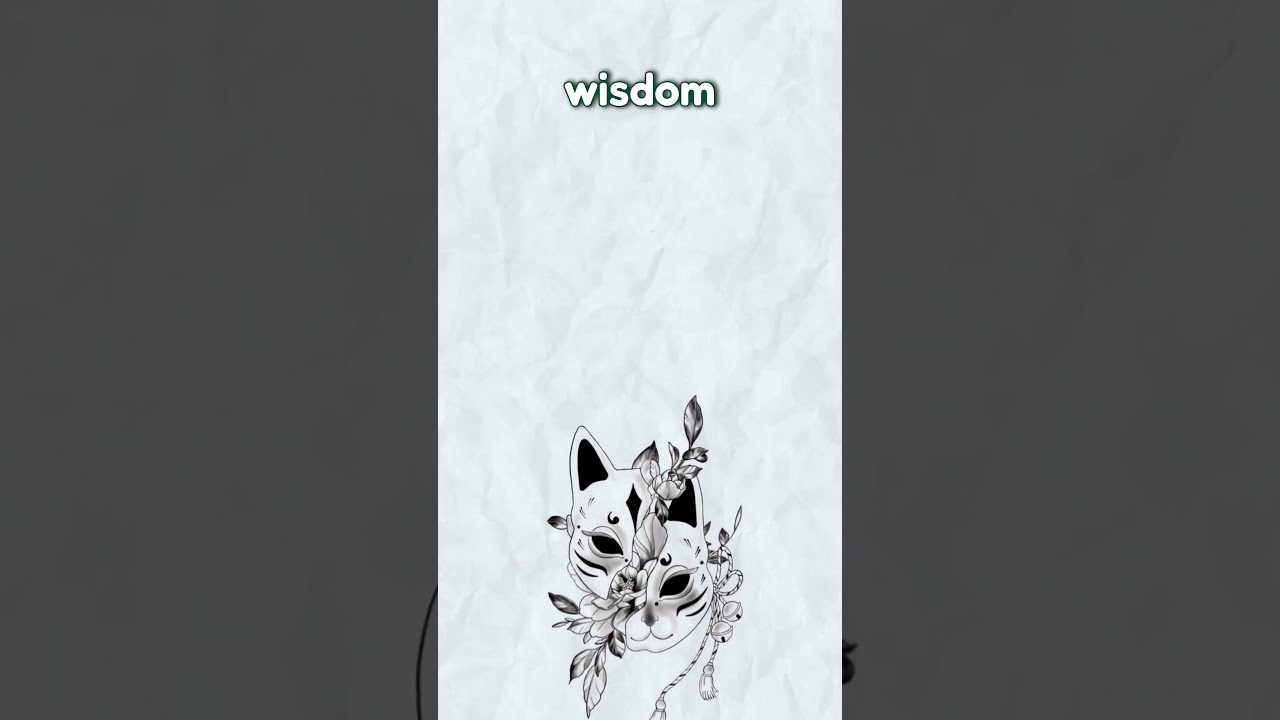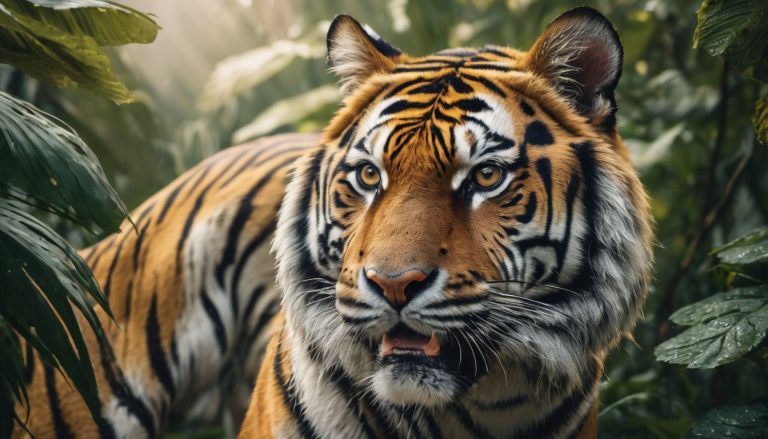The Symbolism and Meanings of Kitsune Tattoos
Create your own unique tattoos and art for your home
Interested in the deep meanings behind kitsune tattoos? These designs aren’t just eye-catching; they carry a rich history from Japanese folklore. Our guide will unravel the symbolism and allure of these mystical foxes, linking them to wisdom and transformation.
Discover their secrets below!
Key Takeaways
- Kitsune tattoos draw inspiration from Japanese folklore where the fox (kitsune) is seen as intelligent and mystical, often linked to wisdom, prosperity, and transformation.
- There are various kitsune tattoo designs such as the nine-tailed fox symbolizing longevity and magical abilities, or the kitsune mask with flowers representing beauty and rebirth.
- In Native American culture, the fox also serves as a trickster figure teaching lessons about life’s complexity; these stories contribute to their symbolism in tattoos.
- Foxes are respected in multiple cultural mythologies for their adaptability and intelligence which are celebrated through contemporary body art choosing kitsune designs.
- Proper care after getting a kitsune tattoo is crucial for healing; it involves keeping the tattoo clean, moisturized with proper ointment, and protecting it from direct sunlight.
The Meaning and Symbolism of Kitsune Tattoos
Foxes hold significant symbolism in various mythologies and cultures, representing traits such as cunning, wisdom, and transformation. In Japanese folklore, the Kitsune is a revered creature known for its shapeshifting abilities and association with the goddess Benzaiten.
Additionally, foxes are viewed as trickster figures in Native American traditions and are often seen as symbols of protection and good fortune in many contemporary contexts.
Foxes in Mythology
Throughout history, foxes have captivated the human imagination and played a significant role in various mythologies. In Japanese mythology, the kitsune is revered as a creature of intelligence and magic.
Often connected to the goddess Benzaiten, these mystical foxes are symbols of prosperity and good fortune. They possess the power to transform into humans and bring about change or rebirth.
This duality reflects not only their wisdom but also their ability to navigate between worlds.
Fox stories from Native American cultures depict them as clever tricksters who use their wits to outsmart others. These tales teach important life lessons through the fox’s adventures.
Similarly, in European folklore, foxes frequently appear as cunning characters able to evade danger with grace and ease. Their mythical presence across different cultures highlights a universal respect for this spirited animal’s versatility and survival skills.
The Japanese Kitsune
The Japanese Kitsune holds deep cultural and symbolic significance in Japanese mythology. In ancient beliefs, the nine tails of the kitsune symbolize a great number of generations of children, while in Japanese symbolism, the image of a fox represents wisdom, cunning, and dexterity.
These tattoos are often seen as a lucky symbol of change, rebirth, and an abundance of money linked to the Japanese Goddess Benzaiten. Kitsune tattoos can also represent protection, safety, guardianship as well as the transformative spirit of the fox.
Kitsune tattoos are popular for their symbolism of good fortune and clever cunning. They also highlight both good and bad aspects by representing duality and balance in life on earth.
The Fox as a Native American Trickster
The Native American culture also has stories portraying the fox as a trickster figure. In these tales, the fox is often depicted as clever and cunning, using its intelligence to outwit others.
The fox embodies both positive and negative qualities, representing the balance of life on earth. Its role as a trickster highlights the complexity and duality of nature, reflecting wisdom and adaptability in challenging situations.
These stories convey deeper meanings about resilience, survival, and the importance of wit in navigating life’s challenges.
In Native American lore, the fox symbolizes more than just a mischievous character; it represents a multifaceted spirit that encompasses intelligence, adaptability, and transformation.
Foxes as Wild Animals
In contrast to their mythical and spiritual representations, foxes are fascinating creatures in the wild. Their natural habitats span across various regions worldwide, from forests to urban landscapes.
Known for their cleverness and adaptability, foxes are skilled hunters with acute senses of sight, smell, and hearing. These agile animals exhibit strong family bonds and communicate using a wide range of vocalizations.
They play a vital role in ecosystems by controlling small rodent populations and contributing to the balance of local fauna.
Foxes have a long-standing reputation for being elusive creatures that roam the wilderness at dawn and dusk. With their sleek reddish fur and bushy tails, they bring a touch of enchantment to the natural world.
Contemporary Views of Foxes
In contemporary society, foxes are often seen as intelligent and adaptable creatures. Their ability to thrive in various environments has led many people to admire their resourcefulness and cunning nature.
Additionally, foxes are also regarded as symbols of transformation and rebirth, reflecting their mythological significance in different cultures. As a result, many individuals choose to incorporate these qualities into their kitsune tattoos, seeking to embrace the positive attributes associated with the fox in Japanese mythology.
Moreover, the popularity of fox symbolism extends beyond traditional beliefs, as modern interpretations emphasize the enduring appeal of these mythical creatures in art and design.
Representing the Fox in Permanent Body Art
In contemporary society, the fox is often represented in permanent body art as a symbol of wisdom, cunning, and adaptability. Kitsune tattoos capture the transformative spirit of the fox and are popular for their deep cultural and symbolic significance.
The intricate designs evoke meanings associated with Japanese mythology, such as representing both good and bad kitsune, symbolizing duality and balance in life.
The popularity of kitsune tattoos lies in their ability to embody various traits including protection, safety, guardianship, change, rebirth, abundance of money, intelligence, femininity or masculinity qualities.
Types of Kitsune Tattoos
– Kitsune Mask Tattoos, Nine-Tailed Fox Tattoos, Kitsune Tattoos with Flowers, Kitsune Tattoos with Geisha and Kitsune Tattoos with Swords are some of the popular types of kitsune tattoos that hold deep meanings and symbolism in Japanese mythology and culture.
Kitsune Mask Tattoos
Kitsune mask tattoos hold deep cultural and symbolic significance, often representing the duality of good and bad spirits in Japanese mythology. The fox mask design symbolizes feminine or masculine qualities while also embodying traits such as intelligence, adaptability, and transformation.
Additionally, these tattoos can also incorporate specific colors and minimalist or traditional designs to further emphasize the wisdom, cunning, and dexterity associated with the kitsune spirit.
These tattoo designs carry ancient beliefs that link them to protection, safety, guardianship, transformational spirits of the fox. Kitsune masks are popular choices for those seeking permanent body art that embodies luck and clever cunning while reflecting their respect for Japanese culture’s rich symbolism.
Nine-Tailed Fox Tattoos
Moving from kitsune mask tattoos, another popular design is the nine-tailed fox tattoo. In Japanese folklore, the nine-tailed fox, or Kyubi no Kitsune, is a mythical creature with strong magical abilities.
Representing longevity and wisdom, these majestic creatures are often depicted in vibrant colors with multiple tails curling around them. The number of tails on the fox symbolizes its age and power; it’s believed that when a kitsune reaches 1,000 years old, it will have all nine tails.
In addition to representing longevity and wisdom, nine-tailed fox tattoos can also convey protection and transformation. Each tail tells a story of growth and development over generations while serving as guardians against negative forces.
Kitsune Tattoos with Flowers
Continuing the exploration of kitsune tattoos, another popular design incorporates the beauty and symbolism of flowers. The addition of flowers to a kitsune tattoo creates a captivating fusion of nature and mythological creature, often symbolizing beauty, transformation, and rebirth.
These tattoos can feature intricate fox imagery intertwined with vibrant blooms such as cherry blossoms or peonies, each carrying its own symbolic significance in Japanese culture.
Combining the elegance of flowers with the mystique of the kitsune adds depth to the tattoo’s meaning and represents a harmonious blend of natural elements and spiritual symbolism.
Kitsune tattoos adorned with flowers intricately capture themes like renewal, abundance, resilience, femininity or spirituality. This combination encapsulates both cultural reverence for nature and ancient beliefs regarding divine entities associated with transformational powers.
Kitsune Tattoos with Geisha
Kitsune tattoos featuring geisha are an embodiment of femininity and mystery. Geishas, known for their elegance and grace, symbolize beauty, artistry, and allure. When combined with the mystical symbolism of the kitsune, these tattoos represent a captivating fusion of cultural and mythological elements.
The imagery can evoke feelings of enchantment and intrigue while also celebrating the transformative qualities associated with both figures. Kitsune tattoos with geisha capture the essence of Japanese artistry and spirituality, making them a striking choice for those seeking meaningful body art that resonates with Japanese cultural symbolism.
Geisha in kitsune tattoos often embody ideals such as gracefulness, wisdom, and emotional depth—qualities that resonate deeply within Japanese culture. This combination brings to life a powerful representation of feminine strength intertwined with spiritual mystique.
Kitsune Tattoos with Swords
Kitsune tattoos with swords are a powerful representation of strength and protection. The addition of the sword symbolizes courage, bravery, and the ability to defend oneself. In Japanese mythology, the sword is often associated with honor and nobility, adding an extra layer of meaning to the Kitsune tattoo design.
The combination of the fox spirit and the sword creates a striking visual representation of resilience and guardianship.
The kitsune tattoo with a sword is also symbolic of transformation and rebirth. It embodies the duality within human nature – representing both wisdom and warfare, cunning intelligence combined with formidable strength.
Popular Kitsune Tattoo Designs and Meanings
Fox Mask with Flowers represents beauty and transformation, Fox Mask with Geisha symbolizes femininity and mystery, while Fox with a Sword signifies strength and protection. Each design carries its own unique meaning in Kitsune tattoos.
Fox Mask with Flowers: beauty and transformation
The Fox Mask with Flowers tattoo design is a beautiful representation of transformation and rebirth. The addition of flowers symbolizes beauty, growth, and the cycle of life. In Japanese mythology, foxes are seen as messengers of the rice deity Inari, representing fertility and abundance.
Additionally, in many cultures, floral motifs represent love, grace, and natural beauty – all attributes closely associated with the transformative nature of the fox.
This tattoo design holds deep cultural significance and represents not only aesthetic beauty but also spiritual growth and change. The combination of the fox mask with flowers creates a powerful symbol that embodies both inner and outer transformation.
Fox Mask with Geisha: femininity and mystery
The Fox Mask with Geisha tattoos symbolize femininity and mystery in Japanese culture. The fox, often associated with intelligence and adaptability, represents the enigmatic nature of the geisha.
This tattoo design combines the allure of the geisha’s mystique with the clever cunning attributed to foxes in Japanese mythology, creating a powerful symbol of feminine strength and mystery.
In traditional Japanese folklore, the kitsune is known for its shape-shifting abilities and cunning intellect. When combined with an elegant geisha, it embodies grace and allure while carrying an air of secrecy that adds depth to this captivating tattoo design.
Fox with a Sword: strength and protection
Strength and protection are symbolized in a Kitsune tattoo depicting a fox with a sword. This design represents the fox’s cunning and agile nature, embodying strength in the face of challenges.
The sword signifies protection, serving as a guardian against adversity and danger, making it an ideal choice for those seeking to convey resilience and safeguarding qualities through their body art.
Indicative of bravery and valor, this tattoo design also reflects the protective nature of the kitsune spirit while exuding an aura of power and determination. Additionally, it symbolizes courage in times of hardship, making it an empowering choice for individuals seeking to express their inner fortitude through their tattoos.
The Process of Getting a Kitsune Tattoo
Finding a design and choosing placement, selecting a reputable tattoo artist, and caring for your new tattoo are important steps in getting a Kitsune tattoo. To learn more about the symbolism and meanings of Kitsune tattoos, continue reading our blog.
Finding a design and choosing placement
Before getting a kitsune tattoo, consider the design and its placement carefully. Research different designs to find one that resonates with you and holds personal significance. Think about the symbolism and meaning behind each design, ensuring it aligns with your values or beliefs.
Consider discussing your ideas with a knowledgeable tattoo artist who can help create a custom design for you.
When choosing the placement of your kitsune tattoo, think about visibility and comfort. You may want to place it where it can be easily seen or in a more discreet location depending on your preference.
Choosing a reputable tattoo artist
When choosing a reputable tattoo artist, it is essential to research their work and reputation. Look for artists with experience in creating kitsune tattoos or other Japanese mythology tattoos.
Ensure the artist has a clean and professional studio space by visiting beforehand. It’s also crucial to review their portfolio and ask about their process for designing custom pieces.
Additionally, check for certifications and licenses to ensure the artist meets industry standards.
Consider asking friends or acquaintances for recommendations when seeking a reputable tattoo artist. Reading online reviews can provide insight into an artist’s professionalism, cleanliness, and skill level.
Caring for your new tattoo
After choosing a reputable tattoo artist, it’s important to provide proper care for your new kitsune tattoo. Ensure that the area is kept clean and dry during the initial healing process, which typically takes 2-4 weeks.
Apply a thin layer of fragrance-free, hypoallergenic lotion or ointment recommended by your tattoo artist to keep the skin moisturized and aid in the healing process. Avoid exposing your new tattoo to direct sunlight, swimming pools, hot tubs, or saunas until it is fully healed.
It’s also essential to refrain from picking at any scabs that may form and to resist scratching the area as this can cause damage to the design and prolong the healing time.
Conclusion
In conclusion, Kitsune tattoos hold deep cultural and symbolic significance. They symbolize change, rebirth, wisdom, and protection. From representing Japanese goddess symbolism to embodying transformative spirits, Kitsune tattoos are popular for their meanings of good fortune and cunning intelligence.
Whether it’s the nine-tailed fox or the fox mask with flowers or geisha, each design holds a unique representation in body art. When considering a kitsune tattoo design, understanding the rich symbolism behind it adds depth to this beautiful form of self-expression.
FAQs
1. What do kitsune tattoos symbolize?
Kitsune tattoos represent the spirit animal, embodying transformation, rebirth, and the characteristics of mythological creatures from Japanese culture.
2. Are fox tattoos considered lucky?
Yes, in many cases fox-related ink can be seen as a lucky symbol tattoo inspired by Japanese goddess symbolism and cultural beliefs.
3. What meanings are connected to a fox spirit tattoo?
The symbolism of fox tattoos often connects to cunning intelligence, adaptability, and being spirited guides or messengers in folklore.
4. Can kitsune tattoos reflect personal change?
Absolutely! Kitsune or fox spirit symbolism is frequently chosen for tattoos that signify one’s journey through change or a desire for new beginnings.










